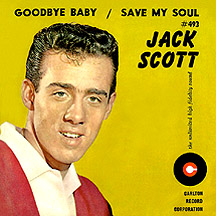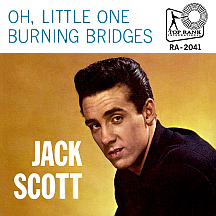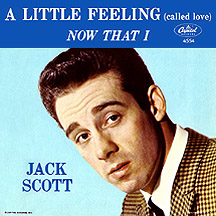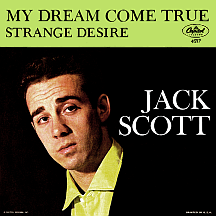JACK SCOTT
When Giovanni Scafone relocated from Windsor, Ontario across the river to Detroit, he brought his own brand of Canadian rock and roll with him. It didn't happen right away, since he was about ten years old when he made the move, but by the time he was 22 in 1958, a song about a guy who's 'back in jail again' kicked off a three-year streak of nonstop hits.
His teen years in Motor City suburb Hazel Park were filled with one odd job after another to help support a large family, including six younger siblings. Giovanni found time to listen to country radio and learned to play guitar, with his dad's help at first, after which The Southern Drifters were assembled and started making the rounds at small clubs including Bill's Barn in Utica at the north end of the Detroit area. Response to the group was good, if not crazy at times. Giovanni became Jack Scott, a shortened anglo approximation of his name, and the group cut a few sides at the city's largest recording studio, United Sound. With Dave Rohillier on lead guitar, George Kazakas on sax, Stan Getz (not the famous jazz saxophonist) on bass and Dominic Scafone (Jack's cousin) on drums, "Baby, She's Gone" was picked up by ABC-Paramount and released as a single in 1957. After that came "Two Timin' Woman." Both were midtempo rockers written by Scott. Neither was successful.
The label passed on what would have been the third single. Former RCA Victor A&R man Joe Carlton, employed at ABC-Paramount during the time Jack was there, had been involved in Elvis Presley's early career. Joe saw something ABC didn't and finagled a deal to get him on his own Carlton label, an early 1958 startup. The rejected record, "Leroy," was an uptempo rocker based on the misadventures of a friend of Jack's from Windsor, known for getting into more than a few bar fights. According to the song, he 'lives in cell block two' and 'just can't go straight.' Originally called "Greaseball," the potentially offensive title was changed before release; the fictional name of the song's protagonist came from some writing Jack saw on the wall of a public bathroom: "Leroy was here." It was the new label's first hit, appearing on the charts in May '58. The song quickly jumped into the top 30 and within a few weeks the ballad B side, "My True Love," joined it, becoming the bigger hit of the two with several weeks in the top ten during August and September.
The follow-up 45 employed the same formula, pairing ballad with rocker. "With Your Love," like "Your True Love," featured Jack's deep baritone vocal while the flip side, "Geraldine," made his attraction to said girl clear by repeating her name about 110 times in two minutes and ten seconds! Joe Carlton kept a hands-off policy, giving Jack complete freedom in the studio. All of his records for the label were self-composed and featured backup vocals by popular local group The Chantones, much in the way The Jordanaires were effectively used on many early Elvis sessions. The U.S. Army cramped Jack's style for awhile after an induction notice was delivered in December. He didn't like having to leave his current girlfriend and on the next single he reflected those feelings, referring to himself in the lyrics as Johnny. "Goodbye Baby" was Jack Scott's second top ten hit in early 1959.
He was stationed at Fort Knox, Kentucky, surely not tempted by the billions in bullion reserves there since he'd already struck gold a couple of times with his music. During that time, Carlton released one of Scott's strongest tracks, "I Never Felt Like This," a minor hit falling well below expectations, with Jack unable to tour or make any attempts to help promote the record. He was discharged after about five months due to a serious ulcer, enabling a prematurely welcome return to civilian life and his old rocking ways. A rush was on to get a hot single out and "The Way I Walk" met that immediate goal. The lyrics were only partly finished, but the gap was filled by the Chantones chanting 'de-oo-wee, oo-wee, oo-wee, oo-wee, oo-wah, yip-yip-yip!' The record flat-out cooked...and rebounded nicely from the previous release. The flip, "Midgie," had an attitude of its own (she was a tougher chick than "Geraldine" to be sure); these and other efforts made it clear Jack was the real thing, a solid rockin' revolter firmly on a level with anyone who came from, say, the Sun Records roster.
Carlton began to change his tune, seeking more control over what he felt Jack and the Chantones should record. The singer's management got into a battle with the company's owner and Jack wound up starting the new decade with a new record label, Top Rank. No momentum was lost, as "What in the World's Come Over You" shot to the top ten in February 1960 and "Burning Bridges" made it two in a row four months later (with a strong flip, "Oh, Little One," a hit in its own right). The softer arrangements of these songs would make them seem ripe for country crossover, yet the C&W community didn't embrace Jack's work, though the songs somewhat surprisingly hit the upper reaches of the R&B charts (as "My True Love" had in '58). Carlton, not happy with the defection to another label, continued to release older Scott tracks on his Guaranteed subsidiary, including the smokin' "Go Wild Little Sadie."
Extensive touring in 1959 and '60 took its toll on Jack, a homebody who quickly tired of the lengthy tour bus rides from state to state. His music branched out to include an occasional song he didn't write (notable examples being Bob Nolan's "Cool Water," made famous in the late '40s by Nolan's group The Sons of the Pioneers, and "Patsy," written by Clyde Otis, the man best known for guiding the career of Brook Benton to great heights). After the big 1960 hits, Capitol Records became very interested in Scott and signed the singer-songwriter to a lucrative contract, but just three songs made it to the lower reaches of the charts and after a couple of unforeseeable years with no hits, Capitol dropped him.
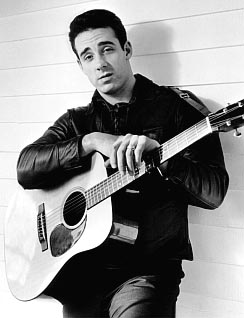
Scott and fellow Detroiter Berry Gordy had crossed paths quite a bit in the late '50s when Jack was hitting big and Berry was breaking out, writing and/or producing hits for Jackie Wilson and, later, Marv Johnson. With Motown firmly established by 1963, Gordy was in the process of expanding the operation with his Mel-o-dy label, set up to focus mainly on country-styled acts (including Dorsey Burnette, who was on the roster for a short time). Jack was tempted but decided instead to grab an opportunity to work with Chet Atkins at RCA Victor (with the records appearing on the Groove Records subsidiary). It may not have mattered either way; despite some of his best work, several releases on both Groove and RCA stiffed. Nor did he have luck with later one-shot releases on ABC, Jubilee and GRT. It was several years later, in 1974, that he finally, but briefly, made an appearance on the country charts with the Dot Records release "You're Just Gettin' Better" before his recording career ground to a halt.
I personally haven't been fortunate enough to catch a Jack Scott performance. I know at least two people who saw him in concert in his later years in the Great Lakes region as a headlining act at some of the area's rockabilly shows. They assure me that Jack, right up into his early 80s, was still a rock and roll force to be reckoned with.
NOTABLE SINGLES:
- Baby, She's Gone - 1957
- Two Timin' Woman - 1957
- Leroy /
My True Love - 1958 - With Your Love /
Geraldine - 1958 - Goodbye Baby /
Save My Soul - 1959 - I Never Felt Like This /
Bella - 1959 - The Way I Walk /
Midgie - 1959 - There Comes a Time - 1959
- What in the World's Come Over You - 1960
- Burning Bridges /
Oh, Little One - 1960 - What Am I Living For - 1960
- Cool Water /
It Only Happened Yesterday - 1960 - Go Wild Little Sadie - 1960
- Patsy - 1960
- Is There Something on Your Mind /
Found a Woman - 1961 - A Little Feeling (Called Love) - 1961
- My Dream Come True - 1961
- Steps 1 and 2 - 1961
- You're Just Gettin' Better - 1974


